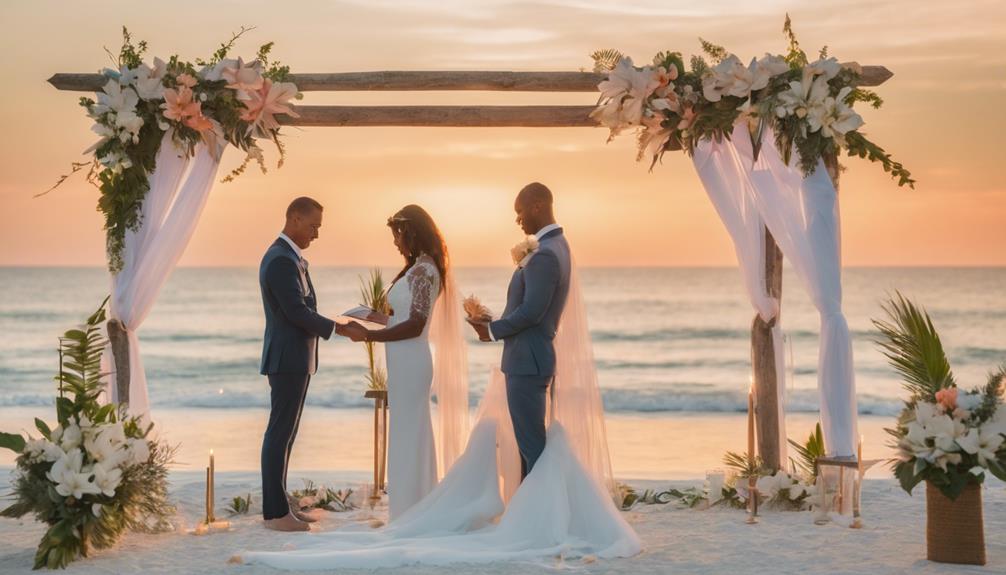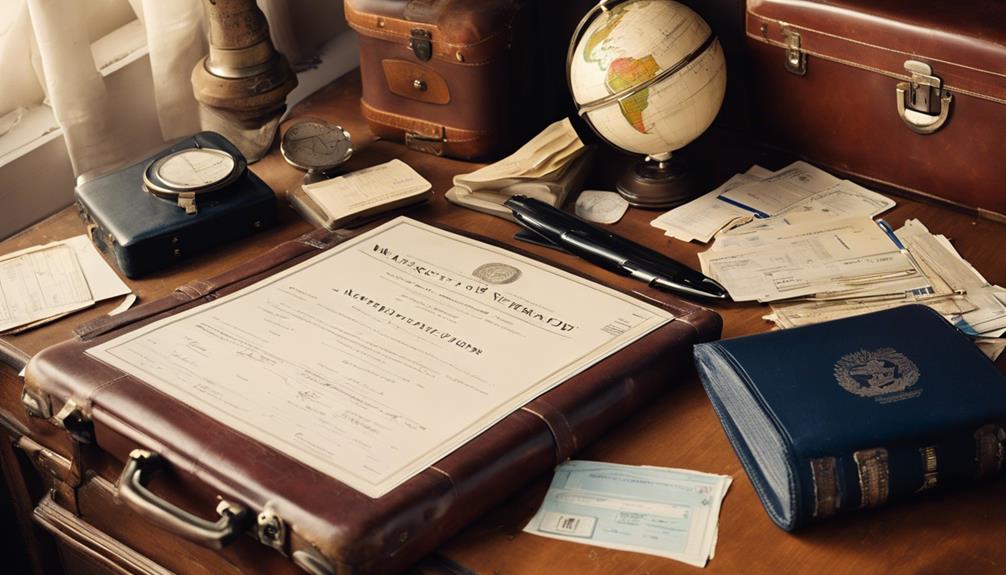Getting married abroad requires careful planning and attention to detail. First, research the legal requirements in your chosen destination, including necessary documents like birth certificates and affidavits. Make sure all papers are translated if needed. Choose a destination that’s accessible and consider the seasonal weather and local laws. Budget for both obvious and hidden costs, like transportation and venue fees. Hiring local vendors can help simplify logistics and add authenticity. They also have valuable insights into local legalities and customs. These steps will set the stage for your celebration far from home, offering a glimpse into further planning essentials.
Legal Requirements Abroad

When getting married abroad, you’ll need to navigate the unique legal requirements of your chosen destination. Start by researching the specific marriage registration processes in the foreign country. Each country has different rules—some might require a residency period before the wedding, while others might ask for specific documentation.
Common documents you’ll need to prepare include birth certificates and valid passports. If you’ve been married before, proof of dissolution such as divorce decrees or death certificates may be required. In certain places, you might even need to undergo blood tests or provide notarized affidavits of eligibility to marry.
It’s essential to have these documents translated if they’re not in the local language. Contacting the local embassy can provide guidance on these legal requirements and help you understand any additional steps, especially regarding immigration implications if you’re marrying a foreign national. They can also advise on visa requirements for your spouse.
Make sure your marriage abroad will be recognized back home by consulting your state’s Attorney General. By preparing thoroughly, you can guarantee your marriage is legally binding and enjoy a seamless wedding experience in your chosen location.
Choosing Your Destination
Choosing the perfect destination for your wedding abroad involves a blend of excitement and practical considerations. Start by exploring popular destination wedding locations like Santorini, Greece, and Tulum, Mexico. These places offer breathtaking settings and unique cultural experiences.
However, before diving into planning a destination wedding there, research the local law regarding marriage. Each country has its own legal requirements, which may include specific documentation and residency rules. It’s crucial to understand these to avoid unexpected hurdles.
Consider the accessibility of your chosen location. Confirm that travel logistics, such as flights and accommodations, are convenient for your guests. You’ll want everyone to arrive with ease and enjoy the celebration without stress.
Additionally, assess the seasonal weather patterns to avoid extreme weather or peak tourist seasons, which can impact both costs and comfort.
Language barriers might also pose a challenge. Learning a few key phrases or hiring a local coordinator who speaks the language can greatly ease communication issues.
Budgeting for the Big Day

You’ve picked the perfect location for your destination wedding, and now it’s time to make sure the celebration fits within your financial plan.
Budgeting for the big day involves more than just comparing the average cost of a destination wedding, approximately £11,099, to a UK wedding. You’ll need to dig into details to avoid overspending.
Start by considering these key factors:
1. Hidden Costs: Destination weddings often come with unforeseen expenses like venue fees, guest transportation, and additional events such as welcome dinners or brunches.
These hidden costs can quickly inflate your overall budget, so plan accordingly.
2. Travel-Related Expenses: Account for transport and accommodations for your guests.
Communicate these costs clearly to prevent misunderstandings. Don’t forget about currency conversion fees and international transaction charges, which can add up if not budgeted for.
3. Seasonal Pricing: Research the seasonal pricing of your chosen location.
Opting for weddings during shoulder seasons can provide significant savings compared to peak seasons.
Hiring Local Vendors
Exploring the vibrant world of local vendors can add a special touch to your destination wedding, immersing you and your guests in the authentic culture of your chosen location. When diving into wedding planning, consider hiring local vendors who bring unique services and regional flair to your celebration.
Their established relationships with wedding venues and other suppliers can streamline logistics, often leading to smoother arrangements and potentially better deals due to their local expertise.
As you select local vendors, review their portfolios and testimonials carefully. This practical advice guarantees their style and quality align with your vision.
Language compatibility is essential, so find vendors fluent in your language to maintain clear communication throughout the planning process. This ease of understanding reduces stress and minimizes misunderstandings.
Moreover, local vendors are typically well-versed in the legal requirements and customs specific to the destination. Their knowledge can be invaluable, helping you navigate any regulations regarding services like catering and photography.
Preparing Essential Documents

How do you guarantee you have all the necessary paperwork for marrying abroad? Start by researching the specific marriage requirements of your chosen destination. These requirements can vary, so it’s vital to understand what’s needed.
Essential documents often include valid passports, birth certificates, and proof of dissolution of any previous marriages. Keep in mind that these documents might need to be translated into the local language, and some countries might ask for an affidavit of eligibility.
Here are three steps to make the process smoother:
- Research Marriage Requirements: Check the residency periods and specific documents required by the country. Some places might even require blood tests or medical documentation.
- Prepare Essential Documents: Confirm all your documents are valid and translated if necessary. An affidavit of eligibility can often be notarized by a U.S. consular officer.
- Consult the Local Embassy: They can provide the most current information and help you understand the legalities involved. This guarantees you’re compliant with local laws when getting married abroad.
Conclusion
Planning a wedding abroad might seem intimidating, but with the right approach, you’ll pull off an unforgettable celebration. Immerse yourself in the legal requirements, choose a destination that speaks to your heart, and set a realistic budget. Don’t forget to hire local vendors who know the ins and outs of the area. Gather all necessary documents in advance. By staying organized and embracing the adventure, you’ll create a memorable day that reflects your unique love story.



